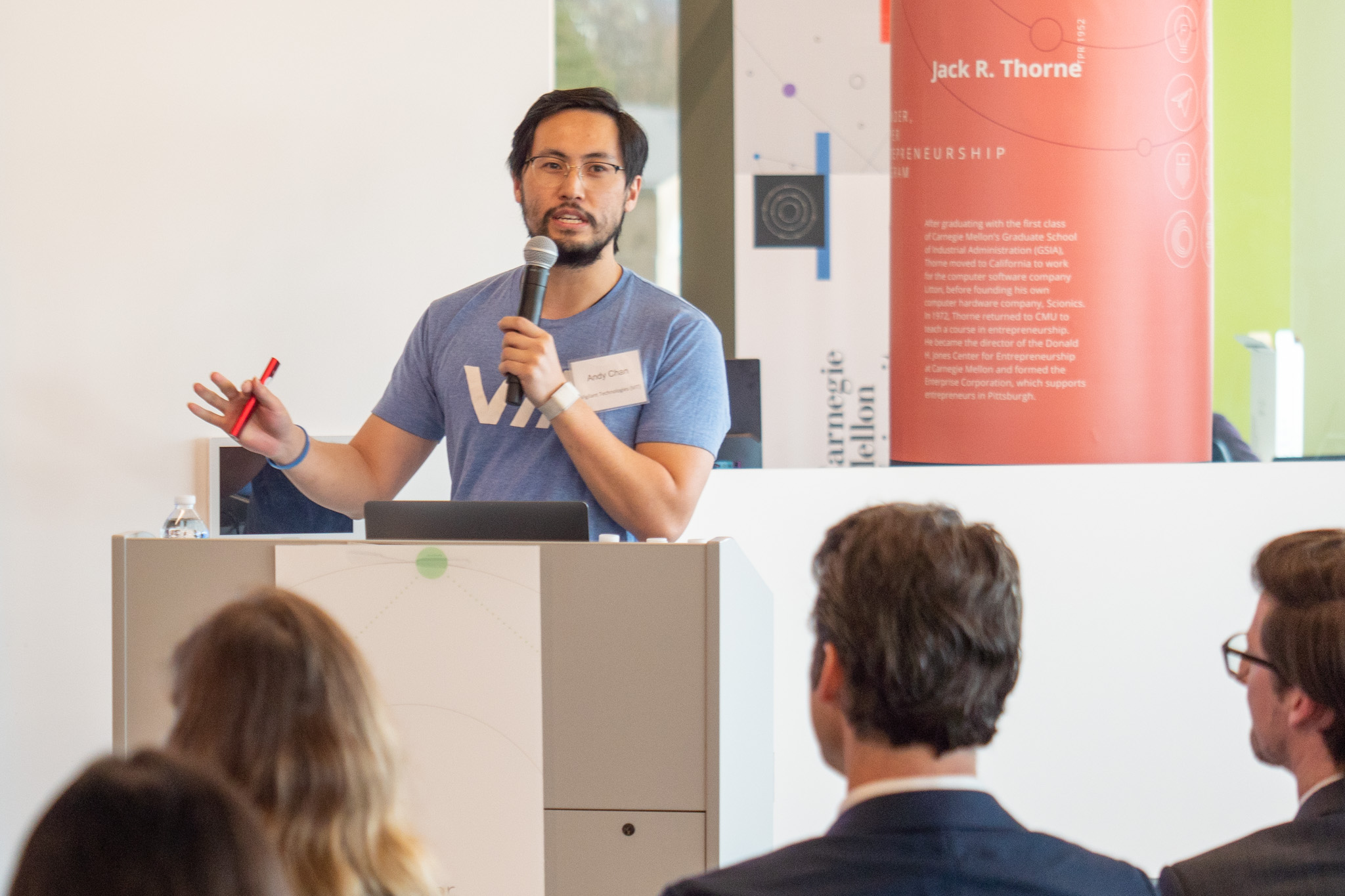What’s the future of Pittsburgh’s startup ecosystem? Here’s a glimpse.
The latest crop of startups from the incubator that helped give Duolingo its start presented their progress so far last Thursday when Carnegie Mellon University’s Swartz Center for Entrepreneurship hosted its 25th Project Olympus Show & Tell. The event series launched in June 2007 showcases the latest success stories and entrepreneurial efforts from the CMU community within the Project Olympus program.
One of many initiatives out of the Swartz Center to foster university entrepreneurship, Project Olympus provides support and resources to faculty, students, recent alumni and staff looking to turn research or other academic projects into startups. Those who participate in the program will have access to programming, a business coach, expert industry advice, free startup workspace, networking and funding opportunities.
Like past Show & Tell events, last week’s featured presentations from founders of companies that saw prominent exits in 2021 — including Wise Telemetry, Root Health Coach and Vigilant Technologies — as well as startups currently benefitting from Project Olympus resources, like MindTrace, Biohybrid Solutions, Shepherdme.ai, E-Carebetics, Biombyx and Equa Health. And, in Show & Tell tradition, the event brought in a speaker with an outside perspective, this year inviting InnovatePGH Executive Director Sean Luther to share insights on the overlap between Pittsburgh’s entrepreneurship economy and CMU.

Biohybrid Solutions founder and VP of Reaserch Antonia Simakova. (Courtesy photo by Foo Conner | Jekko)
While the event itself is relatively simple — some short presentations and mingling with recently successful CMU-affiliated startups — it sheds light on how the university approaches translating academic research to commercialization projects. It also serves as a preview of what kinds of startups might be on the road to successful exits. Alumni of the Project Olympus program include companies that have been acquired by the likes of Facebook, Amazon, Google and more, as well as companies that have had lucrative public offerings, such as Duolingo.
The group of startups presenting at this most recent event heavily featured the life sciences, with two of the three exits and five of the six startups that presented working in or adjacent to the field. The presence of that work at CMU shows that Pittsburgh’s longtime life sciences expertise that’s anchored by UPMC and the University of Pittsburgh School of Medicine might finally be turning a corner on increased commercialization opportunities.
That’s by design, Luther said at the Show & Tell. One of the main purposes of building an innovation district based near the city’s two leading universities, he explained, is to bridge the physical distance gap between academic research teams and the business people that want to take their ideas to market.
“The opportunity with increasing the real estate activity here in Oakland is to make sure that those teams have walkable access to each other — to make sure that that dynamism and that density of office really packaged up and captured pushes our startup economy forward,” Luther said. “We also know that that’s especially important for life science companies who are particularly sticky back to their on-campus labs.”

Project Olympus Director Kit Needham introduces the 25th Show & Tell. (Courtesy photo by Foo Conner | Jekko)
Luther, along with Project Olympus Director and Assistant Dean for Entrepreneurial Initiatives Kit Needham, underscored that the many successful exits out of Pittsburgh this year, from CMU and beyond, demonstrate a turning point for the city’s startup economy. But Luther in particular attributed that success more to CMU’s prowess in growing young companies than the city’s role in supporting them.
“The fact is, given the research capabilities and the academic success that we have here on campus at Carnegie Mellon, at UPMC, and at the University of Pittsburgh, we’re actually continuing to punch under our weight as a region in terms of new companies starts and number of people who are employed by high tech and startup industries,” he said. Contributing to that are lower local birth rates and continued migration away from the region that began with the end of the steel industry here. “So we really see you all in the innovation sector as the future and the economic basis of a continued recovery for Western Pennsylvania.”
Watch the full recording of the presentations and Luther’s remarks.
Sophie Burkholder is a 2021-2022 corps member for Report for America, an initiative of The Groundtruth Project that pairs young journalists with local newsrooms. This position is supported by the Heinz Endowments.Join the conversation!
Find news, events, jobs and people who share your interests on Technical.ly's open community Slack





